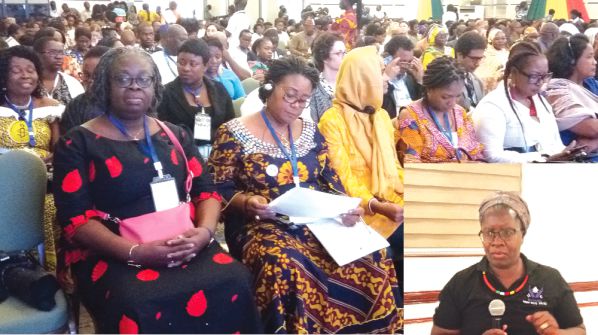
AU Summit tells state parties to invest in girls’ education
The second African Union (AU) Summit on Ending Child Marriage in Africa (held in Accra recently) has called on state parties to invest in the education of girls to build a better social and economic status for their future.
The four-day event,held from November 20 to 24, 2018, on the theme: “Enough with the Silence,” was an initiative of the AU and it brought together hundreds of delegates from over 30 African countries, including four First Ladies from Ghana, Niger, Liberia and Sierra Leone and the AU Commissioner for Social Affairs, Mrs Amira Elfadil Mohammed Elfadil.
The second AU Girls summit sought to address the core need of investing in adolescent education, specifically access to services such as sexual health care, sexuality education and rights protection.
It looked at progress made on commitments, interventions, measures and recommendations of keeping girls in school and facilitating Sexual and Reproductive Health Rights (SRHR).
In line with efforts to end child marriage and other harmful traditional practices against girls, DANIDA, in partnership with Save the Children, used the occasion to launch a Sahel Regional programme which sought to increase organisational capacities of regional civils society organisations and youth networks in order to effectively engage the African Union to influence social and political change on Ending Child Marriage and Children on the Move in the Sahel.
The summit was a follow-up to the first AU Girls Summit held in 2015 in Zambia which was aimed at sharing experiences and good practices and ultimately initiating discussions and programmes to end child marriage at the country, regional and international levels by drawing experiences from countries that have launched such campaigns.
Key recommendations
Among some of the key recommendations made after the summit was the need for state parties to strengthen integrated girl-centred comprehensive sexuality education and adolescent-friendly sexual and reproductive health and rights (SRHR) services for girls in and out of school, with focus on conflict zones, refugee camps, youth with disabilities, girls in prisons among others.
It also called for emphasis on SRHR education for parents and teachers and on countries to help ‘break the silence’ by empowering young people, especially girls, to be able to stand up, speak up and challenge harmful socio-cultural, religious and traditional norms and values and most importantly for the authorities to amply listen to the voices our girls, voices of those who are at risk.
The summit also recommended a legal framework for government to enact laws and policies that would prohibit child marriage and ensure the full implementation of such law or policy.
It also called for the full inclusion of Persons Living with Disability (PLWD) by accelerating and opening up discussions further to include other vulnerable girls in conflict zones, deprived areas and most importantly persons living with disability, saying they were four times more vulnerable to acts of child marriage.
They also called for resource allocation which they said was critical to ending child marriage.
It also recommended the strengthening of support for alternatives to child marriage, especially by making schools accessibly, enjoyable and affordable in the bid to keep girls interested.
Finally, it called for collaboration and a multisectoral approach to ending child marriage through concerted effort, urging the government departments, local institutions, private sector, media, international agencies, parents, traditional and religious leaders and every individual to get involved in ending child marriage in African.
Girls not bride
As part of the summit, WiLDAF, with support from Save the Children, held a side event with delegates from the Sahel Region including Mali, Burkina Faso, Mauritania, Niger, Senegal and Chad to assess the progress made in ending child marriage in the region.
They also shared experiences on lessons learnt, best practices and also to strategise on how to provide better protection for children against early marriage by bringing the key actors to work together.
The AU Goodwill Ambassador for the campaign to end Earlier Child Marriage (ECM), Ms Nyaradzayi Gumbonzvanda, urged the participants to fully commit to the cause of ending child marriage by standing up, speaking out and solving our own problems.
Other contributions from participants focused on accelerating efforts to push for sound and holistic programming, adequate resources allocation and legislative reform, especially setting the legal age of marriage at 18 for girls and boys.
